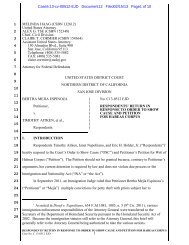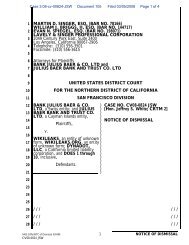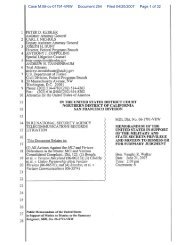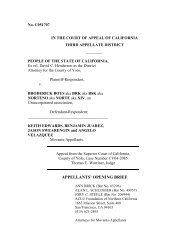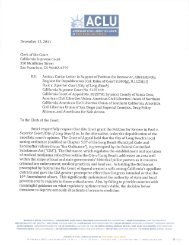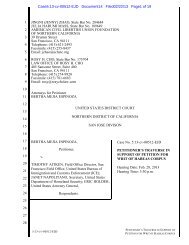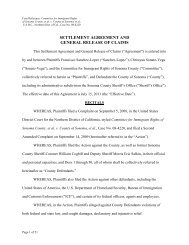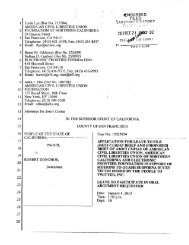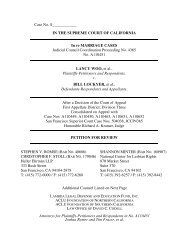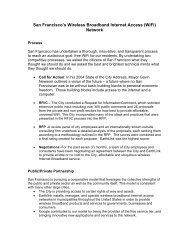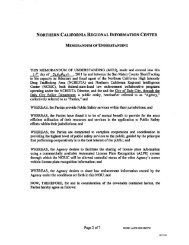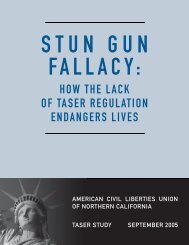Public Safety Realignment - ACLU of Northern California
Public Safety Realignment - ACLU of Northern California
Public Safety Realignment - ACLU of Northern California
- No tags were found...
Create successful ePaper yourself
Turn your PDF publications into a flip-book with our unique Google optimized e-Paper software.
housing, food, transportation, clothing, education, and employment. All current inmates in the countyjail whose most serious conviction is a misdemeanor will be shifted into alternatives to incarceration,such as community corrections supervision and programming, in order to make room in the jail forindividuals convicted <strong>of</strong> more serious <strong>of</strong>fenses.Graduated SanctionsAnother cost-effective evidence-based practice employs the use <strong>of</strong> graduated or intermediatesanctions against those who violate their terms <strong>of</strong> probation or other post-conviction release. Instead<strong>of</strong> automatically returning someone to jail if they commit a minor violation, which can significantlydisrupt the very aspects <strong>of</strong> their lives most linked to positive outcomes (such as stable employment),case managers and supervisors should use their judgment or create formal policies to employsanctions short <strong>of</strong> incarceration in appropriate instances.These graduated sanctions can include community service, mandatory residential or outpatientsubstance abuse treatment, or electronic monitoring with or without GPS. <strong>Realignment</strong> also allowsshort-term incarceration to be used as an alternative to being returned to custody to complete one’ssentence. (See discussion <strong>of</strong> “flash incarceration below.)Few county plans mention specific information about utilizing graduated sanctions. San Francisco’splan states that graduated sanction are a key component <strong>of</strong> effective supervision. Santa CruzCounty’s plan notes that even before AB 109 implementation began the County was alreadyemploying graduated sanctions with probationers through the <strong>California</strong> Risk Assessment PilotProject. Santa Cruz will expand the use <strong>of</strong> graduated sanctions during Phase 2 <strong>of</strong> its AB 109implementation from October 2011 to March 2012.Madera County provides perhaps the most detail concerning its planned use <strong>of</strong> graduated sanctions.Madera’s probation department will employ graduated sanctions before revoking PRCS. Theimplementation plan goes into great detail about this: the probation department has been in theprocess <strong>of</strong> reviewing various graduated sanctions programs and processes, and will be collaboratingwith probation departments in the Central Valley to determine the best sanctions matrix systemutilized by other agencies across the state and nation. The department is currently reviewing systemsand sanction matrix’ currently used by the Pennsylvania Department <strong>of</strong> Corrections, the OregonDepartment <strong>of</strong> Corrections and the Napa County Probation Department. The Madera plan specifiesthat its graduated sanction strategies for violating supervision conditions will include: imposition <strong>of</strong>up to 10 days jail (flash incarceration); increased supervision and reporting requirements, increaseddrug and alcohol testing; and referrals to community service, self-help alcohol and drug treatment,and inpatient programs.36



